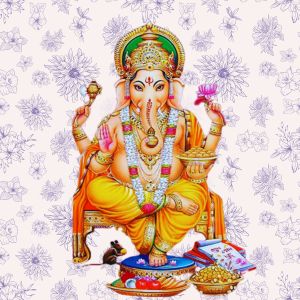Hindu Beliefs About Menstruation

Hinduism has a unique perspective on menstruation, with rituals and practices associated with it. Explore the beliefs and traditions surrounding menstruation with this informative article.
Hindu Dharma Shastra considers a woman to be impure during menstruation.
'Menstruation is a natural phenomenon. Isn't it superstitious, archaic and primitive to consider it to be impure ? ' - This is an often asked question. Some would even consider it to be an invention of a male chauvinistic society.
If menstruation is natural, so are defecation and urination !
Most of the rules in the Dharma shastra were framed to aid the spiritual journey of man. Discerning eyes alone can make sense out of them as it was not a practice to explain the logic and reason behind ancient wisdom.
There are ten kinds of movements in the body called the pranas - five of them major and five of them minor. The major pranas are prana, apana, vyana, udana and samana connected to the different life processes in the body.
Apana is a force that exists in the navel and is responsible for the following functions.
- Throwing out stools.
- Removal of urine.
- Discharge of semen.
- Discharge of ovum during menstruation / aborted pregnancy.
- Labour ( child birth ).
They all have one thing in common - they are all forces of rejection in a downward direction.
Hindu spiritual sciences consider spirituality to be an upward movement - from Muladhara towards Sahasrara as an example or from earth towards heaven. Apana, even though natural is considered to be an interference in this progress. Yogis practice techniques to reverse the direction of the Apana so that it can join with the upward prana.
In all the above five instances, the Apana or the force of rejection is active in the body. Restraint during this period and special cleansing so as to restore the normal equilibrium of the pranas at the end of the period have been prescribed.
Someone in a spiritual mode coming in close proximity to another in the above mode of rejection is also said to interfere with the spiritual quotient / content. Undertaking spiritual or religious tasks during these periods would be unproductive or even detrimental.
Death is another phenomenon where again a unit of life is 'removed' from the family, hence the observance of asoucha by the close family members of the deceased.
Yajurveda ( T.S.2.5.1) talks about Indra killing Trisiras, the son of Tvashta for passing on oblations to the asuras who were his relatives on his maternal side in secret. Indra then moves about with brahma hatya dosha ( sin of killing a brahmin ) heavy in his hands. He requests the earth,trees and women to take this sin away from him. Each one agrees to take one third of the sin in return for a boon. Veda says, women during menstruation ( with stained clothes ) are ( in the state of ) this sin.
Now, we will try to answer some frequently asked questions on menstruation.
- The impurity is for 3 nights starting from the first day. On the fourth day, the impurity goes after bathing.
- For menstruation starting in the night - divide the night into three. If the menstruation starts in the first two parts count from the previous day. If it is in the third part, count from the subsequent day. For example, if it starts at say 11 pm on Sunday night, fourth day will be Wednesday. If it starts at 3 am on Sunday night / Monday early morning the fourth day will be Thursday.
- Eligibility to participate in religious / pitru functions is from the fifth day. However, this should be only after the bleeding stops completely. In the case of extended periods, one has to wait until the bleeding completely stops.
- There is no impurity in bleeding not associated with the regular cyclic menstruation. Bleeding on account of diseases are not considered impure.
- If menstruation happens within 17 days from the onset of the previous one, bathing once will clear impurity. On the 18th day, one day should be observed as impure, on the 19th day two and the 20th day on wards, three days as usual.
The above information is meant for those keen on observing Hindu religious practices voluntarily and strictly has got nothing to with freedom and rights of women. All perspectives in the matter need to respected and hold positions in their own right.
Recommended for you
Mantra for removal of Impediments

om namaste vighnaraajaaya bhaktaanaam vighnahaarine . vighnadaatre hyabhaktaanaam ganeshaaya namo namah' ......
Click here to know more..Adhvaryu - The Yajurvedic Purohita In Yajna

There are four main purohitas in Vedic Yajnas. Among them, Adhvaryu belongs to Yajurveda. Learn more.....
Click here to know more..Chandrasekhara Ashtakam

chandrashekhara chandrashekhara chandrashekhara paahi maam. chandrashekhara chandrashekhara chandrashekhara raksha maam. ratnasaanusharaasanam rajataa....
Click here to know more..
English Topics
Rituals
Click on any topic to open
- 74 What happens after accident or suicide deaths?
- 73 Do Homas and Yajnas still Work in Kaliyuga?
- 72 How Do Remedial Homas Work?
- 71 Hindu Beliefs About Menstruation
- 70 The Significance Of Following Rules While Observing Vratas
- 69 Tamil Brahmin Wedding Rituals
- 68 Significance Of Turmeric And Kumkum
- 67 Medicinal Properties Of Panchamrita
- 66 Tamil Brahmin Death Rituals
- 65 Dana Mantra
Please wait while the audio list loads..
30
Ganapathy
Shiva
Hanuman
Devi
Vishnu Sahasranama
Mahabharatam
Practical Wisdom
Yoga Vasishta
Vedas
Rituals
Rare Topics
Devi Mahatmyam
Glory of Venkatesha
Shani Mahatmya
Story of Sri Yantra
Rudram Explained
Atharva Sheersha
Sri Suktam
Kathopanishad
Ramayana
Mystique
Mantra Shastra
Bharat Matha
Bhagavatam
Astrology
Temples
Spiritual books
Purana Stories
Festivals
Sages and Saints
